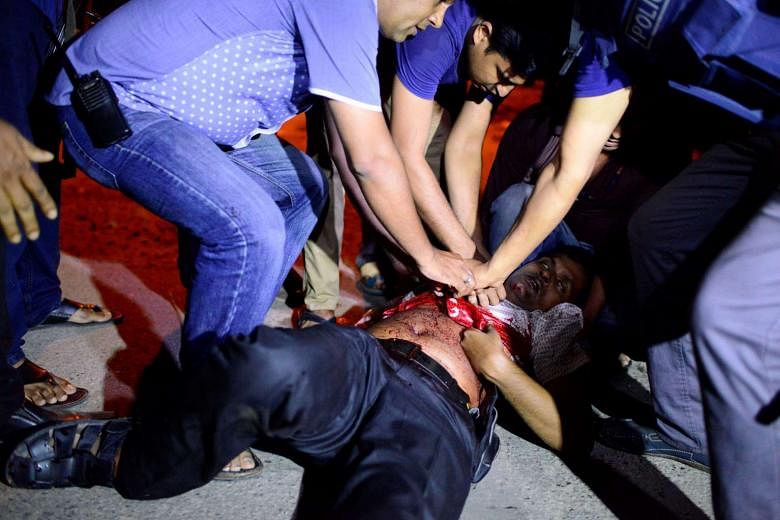DHAKA/NEW DELHI (REUTERS) - Bangladesh, faced with the worst militant attack in its history, is probing deeper for possible ties between the men who murdered around 20 people in a restaurant and trans-national Islamist extremist groups, security officials said.
Until Friday's attack in an upscale part of the capital Dhaka, the government had blamed two home-grown groups for mounting violence, but these were attacks on individuals, most of them with crude machetes and knives, and never a coordinated mass killing.
So, the storming of the restaurant, taking diners hostage, apparently singling out foreigners for death and then fighting a gunbattle to the finish, marked a new level of sophistication and scale, anti-terrorism officials and security experts said.
"We cannot say immediately which group is behind this. But they were terrorists who were trained well," said Brigadier-General Naeem Ashfaq Choudhuri, director-general of military operations for the Bangladesh army.
One line of inquiry being pursued is whether the attackers received any guidance from Islamic State in Iraq and Syria (ISIS) or Al-Qaeda in the run-up to the attack, an official in the police counter-terrorism wing said.
Police were also looking into whether the Dhaka assault was part of, or inspired by a series of attacks elsewhere in the world including on Istanbul airport last month, he added.
ISIS claimed responsibility for the Dhaka attack, and even while the siege was still on, the group published grisly pictures from inside the restaurant apparently sent by the assailants.
The authenticity of the images has not been established, however.
A US government source said some US government experts were now leaning towards the view that ISIS was behind the attack, in which an American citizen was among the dead, along with at least nine Italians and seven Japanese.
AL-QAEDA VERSUS ISLAMIC STATE?
Bangladesh, a pre-dominantly Muslim country of 160 million people, has long maintained that there are no foreign fighters on its soil, although some Western security experts have questioned that.
Officials have said that all seven gunmen in Friday night's attack and overnight siege were local.
It is not yet clear whether they belonged to either of the two main domestic militant movements blamed for a spate of attacks in recent months on bloggers, university teachers and members of religious minorities.
Ansar-al-Islam, considered the better coordinated and more dangerous of the two until now, had pledged allegiance to Al-Qaeda, while Jamaat-ul-Mujahideen had claimed to represent ISIS in Bangladesh.
Security experts in Bangladesh, India and the United States said that even if there were no foreign fighters involved, whichever group mounted the restaurant assault appeared to have benefited from external support.
"This attack was of a level of sophistication that suggests the involvement of a group well schooled in intricately choreographed terror operations, and ISIS and Al-Qaeda fit the bill," Michael Kugelman, a senior South Asia associate at the Wilson Centre, said.
Four pistols, an AK-22 semi-automatic assault rifle, four unexploded IEDs and several sharp weapons were recovered from the scene, Brigadier-General Choudhuri said.
The targeting of people in a restaurant appeared more in line with Jamaat-ul-Mujahideen, which has focused its attacks on non-Muslims, whether a poor rickshaw-puller or a grocer.
Ansar-al-Islam, in contrast, has laid down strict "targeting criteria" under which its fighters attack people carrying out"anti-Islamic" activities such as bloggers criticising radical Islam or activists promoting gay rights.
It has said it will not carry out random killings.
Bangladesh counter-terrorism officials say Ansar follows the ideology and methods of Al-Qaeda, and has a fugitive former army major playing a key role that could make it more potent.
But they and foreign experts also see the risk of an escalating rivalry between Al-Qaeda and ISIS, or their local proxies, in Bangladesh.

